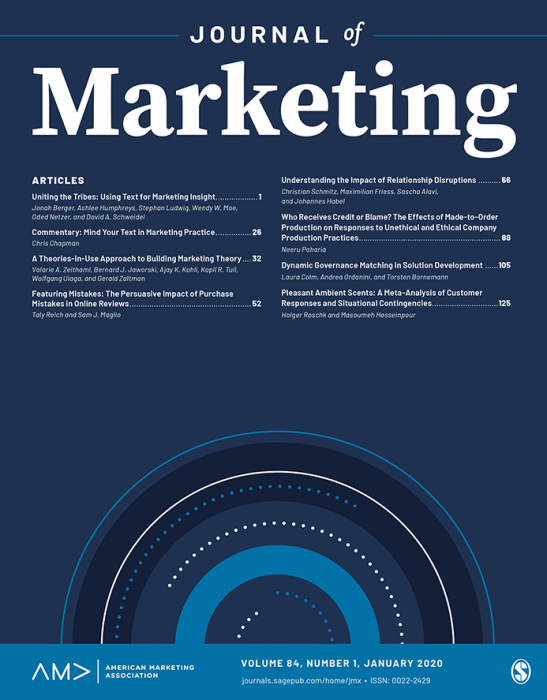Beyond Income: Dynamic Consumer Financial Vulnerability
IF 11.5
1区 管理学
Q1 BUSINESS
引用次数: 8
Abstract
This research challenges the entrenched belief that financial vulnerability affects only low-income consumers. Instead, most consumers across the socioeconomic spectrum experience varying degrees of financial vulnerability at different points during their lives, whether sporadically or chronically; vulnerability is dynamic and heterogeneous. The authors propose a novel, theory-driven definition of consumer financial vulnerability (CFV) as the risk of incurring future harm, given the consumer's current access to various financial resources. A new conceptual framework decouples “vulnerability” from “harm” to distinguish the state of CFV, its determinants (access to various interdependent financial resources), and the constructs it foreshadows (multiple interconnected forms of realized harm). Five research propositions follow: (1) financial resource volatility plays a vital role in CFV, (2) recovering from harm requires more financial resources than preventing harm, (3) a multiperiod lens is needed to assess CFV accurately, (4) greater financial resource access can increase CFV, and (5) generalized financial literacy is not a panacea for mitigating CFV. The propositions and their implications for marketing strategy, public policy, and consumer well-being offer a rich research agenda. The authors propose a measure of CFV—the probability that financial resources are insufficient to meet or exceed a harm threshold—for future empirical investigations.超越收入:动态消费者金融脆弱性
这项研究挑战了根深蒂固的观念,即金融脆弱性只影响低收入消费者。相反,不同社会经济阶层的大多数消费者在人生的不同阶段都会经历不同程度的财务脆弱性,无论是偶尔的还是长期的;脆弱性是动态的和异构的。作者提出了一个新颖的、理论驱动的消费者金融脆弱性(CFV)定义,即在消费者当前获得各种金融资源的情况下,导致未来伤害的风险。一个新的概念框架将“脆弱性”与“伤害”分离开来,以区分CFV的状态、其决定因素(获得各种相互依赖的金融资源)以及它所预示的结构(多种相互关联的已实现伤害形式)。五个研究命题如下:(1)金融资源波动在CFV中起着至关重要的作用;(2)从伤害中恢复比预防伤害需要更多的金融资源;(3)需要多时期的视角来准确评估CFV;(4)更多的金融资源获取可以增加CFV;(5)普遍的金融知识不是减轻CFV的灵丹妙药。这些命题及其对营销策略、公共政策和消费者福利的影响提供了丰富的研究议程。作者提出了一种衡量cfv的方法——财政资源不足以达到或超过危害阈值的概率——用于未来的实证研究。
本文章由计算机程序翻译,如有差异,请以英文原文为准。
求助全文
约1分钟内获得全文
求助全文
来源期刊

Journal of Marketing
BUSINESS-
CiteScore
24.10
自引率
5.40%
发文量
49
期刊介绍:
Founded in 1936,the Journal of Marketing (JM) serves as a premier outlet for substantive research in marketing. JM is dedicated to developing and disseminating knowledge about real-world marketing questions, catering to scholars, educators, managers, policy makers, consumers, and other global societal stakeholders. Over the years,JM has played a crucial role in shaping the content and boundaries of the marketing discipline.
 求助内容:
求助内容: 应助结果提醒方式:
应助结果提醒方式:


